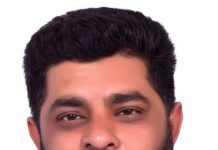Mohali
30 October 2018
DIVYA AZAD

With changing lifestyles, high stress jobs and unhealthy diets, stroke has become the third leading cause of death in most countries. On the occasion of World Stroke Day, two talks were organized at the Fortis Hospital Mohali here.
Dr. H. S Mann, Consultant, Neurology, Fortis Hospital Mohali informed, “Research has indicated that every six seconds, someone dies of a stroke. If you see someone suffering from a stroke, you must think and act promptly.”
A stroke occurs when a blood vessel that carries the oxygen and nutrients to the brain is either blocked by a clot or bursts.
Dr Mann said, “Most people panic when they see a person suffering from a stroke. A lack of awareness confuses them about what is happening to the stroke victim. “FAST” is the best way to identify a stroke.
You need to look out for the following reactions: Face: check if the face is straight or drooping; Arms: confirm if the victim can raise both his arms or not; Speech: if the speech of the person is slurred along with all other symptoms then the chances are that the person is suffering from a stroke and Time: It is suggested that a person act quickly and rush the patient to the closest stroke care facility at the earliest and a neurologist be immediately consulted. Time is brain. Each minute delay in treatment carries damage to two million neurons.”, he warns.
“The fact that stroke related deaths claim more lives than AIDS, tuberculosis and malaria put together, makes it one of the most lethal medical conditions that exist. One in six people in the world will suffer a stroke in their lifetime. One must remember that stroke is treatable. If a person reaches a stroke facility within 4.5 hours; clot bursting therapy can help suppress symptoms and reduce disabilities.”, added Dr Mann.
Dr Amit Shankar Singh, also Consultant, Neurology, said, number of acute stroke patients seen that present to Fortis Hospital are 30-35 per month out of which 8-10 receive Thrombolysis and 3-4 undergo thrombectomy.
Stroke is more common in elderly people commonly above 60 years but can also occur in patients less than 50 years who present as young stroke. Old Age patient have many risk factors like diabetes, hypertension and hypercholestremia. Also age itself is a risk factor for stroke, he added.
Dr JP Singhvi, also a Consultant, Neurology, said, A healthy lifestyle can not only prevent stroke but also other diseases like heart attacks, liver problems, kidney problems, obesity, diabetes, high cholesterol. Stress is related with acute stroke, as stress increases chances of hypertension and derangement in other metabolic parameters. In most of the acute stroke patients, preceding stressful events are generally noticed, he added.






































